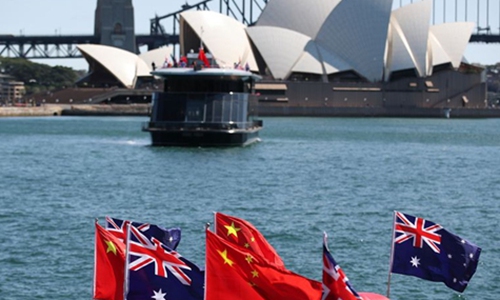Australia should not exonerate a drug trafficker: analysts
By Yang Sheng Source:Global Times Published: 2020/6/14 23:23:40

Chinese and Australian national flags are seen at an event in Sydney, Australia, September 8, 2019. Photo:Xinhua
Drug smuggling is an extremely serious crime in China, and Australia should not seek to exonerate a drug trafficker by mixing up a criminal case with its diplomatic ties with China, said Chinese experts after the Australian foreign ministry said it is "deeply saddened" by a Chinese court's decision to sentence an Australian man to death for drug smuggling.Australian Karm Gilespie was sentenced to death for drug smuggling at the first trial by a court in Guangzhou on June 10, Guangzhou Intermediate People's Court said. The only other information the court gave was that the person's property was confiscated.
Gilespie was found to be carrying more than 7.5 kilograms of methamphetamine in his luggage at Guangzhou Baiyun International Airport on December 31, 2013, the Yangcheng Evening News reported.
According to Chinese criminal law, the highest punishment for criminals who smuggle more than 50 grams of meth could be the death penalty.
According to Australian media ABC News on Saturday, a spokesperson for the Department of Foreign Affairs and Trade of Australia said it was providing consular assistance "to an Australian man detained in China," and the spokesperson said "We are deeply saddened to hear of the verdict made in his case. Australia opposes the death penalty in all circumstances, for all people."
Chen Hong, director of the Australian Studies Center at East China Normal University in Shanghai, told the Global Times on Sunday that "Drug trafficking is a serious felony in China and internationally. The verdict to sentence Gilespie to death was made in full compliance with China's laws."
Australia needs to respect the sovereignty and legal independence of other countries instead of interfering with this court decision, Chen said.
Other Australian and international media outlets like the BBC speculated or hinted that the verdict is related to the worsening China-Australia relationship, and it is intended to pressure Australia.
Chinese analysts debunked the claim as being ridiculous to mix crime with diplomacy. Politicizing a legal case is absurd, they said, adding that China does not need to take such a move to retaliate against Australian provocations in diplomatic and other fields.
"To attribute the verdict to the current worsening political relations between the two countries is absurd as it simply mixes two totally separate issues in a bid to exonerate a drug trafficker. Some media outlets in Australia habitually view China through an ideological lens, so trade issues and court rulings get politicized from time to time," Chen said.
China pays great attention to the problem of drug smuggling and imposes sentences on drug smugglers strictly according to the law, said Yu Lei, a chief research fellow at the Research Center for Pacific Island Countries at Liaocheng University. Yu stressed the sentence confirms China's strict application of Chinese law.
Chinese experts noted that China has never shown any tolerance toward drug smuggling and trafficking. China is firm in its stance toward these criminal acts, and the criminals involved, no matter who they are and what country they came come from, will not be exonerated.
In January 2019, Canadian Robert Lloyd Schellenberg was sentenced to death by Dalian Intermediate People's Court for smuggling more than 222 kilograms of meth.
In 2009, British man Akmal Shaikh was executed in Urumqi, northwest Northwest China's Xinjiang Uygur Autonomous Region, for trafficking 4.03 kilograms of heroin from Tajikistan to Xinjiang, although the UK exerted diplomatic and political pressures on China to exonerate on the grounds of "mental illness."
RELATED ARTICLES:
Posted in: DIPLOMACY,CHINA FOCUS